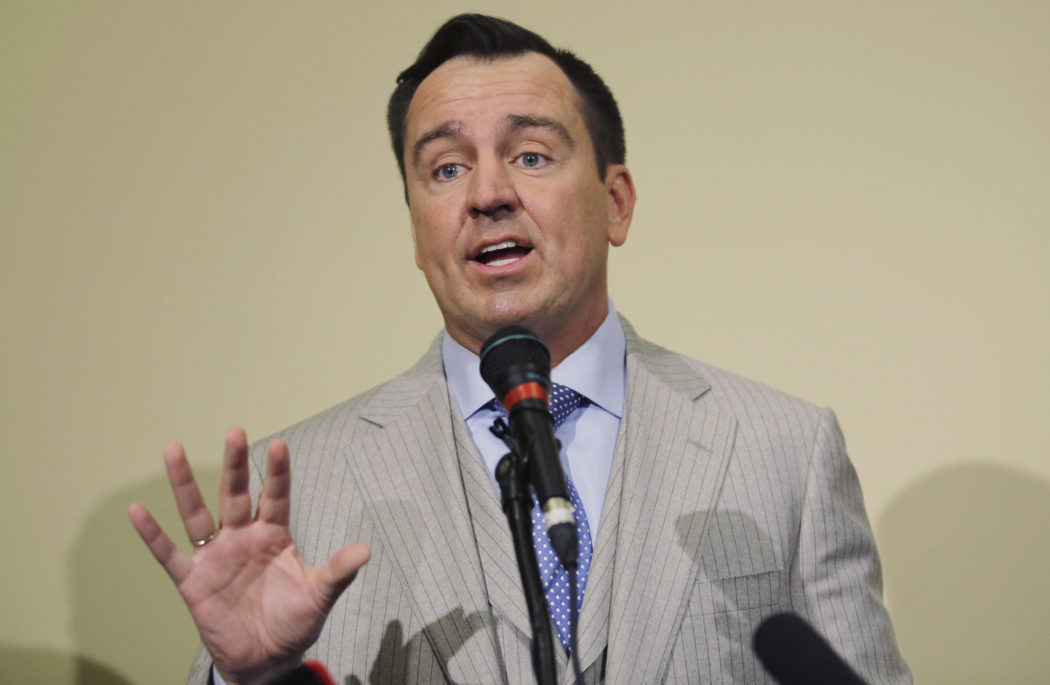Republicans push to ban death penalty in conservative Utah
By MICHELLE L. PRICE, Associated Press
SALT LAKE CITY (AP) — The Republican leader of the Utah House of Representatives backed an effort Tuesday to ban the death penalty in the conservative state, coming three years after lawmakers voted to reinstate the firing squad as a backup method for executions.
House Speaker Greg Hughes and Republican Rep. Gage Froerer, who is sponsoring the measure that faces its first hearing Wednesday, acknowledged that it would be an uphill battle to persuade the GOP-controlled Legislature to abolish capital punishment, though a similar ban came close to passing two years ago.
They told reporters that while abolishing the death penalty has traditionally been seen as a liberal position, conservatives who believe government is imperfect and should be limited also should support it.
“I don’t think it’s the government’s right to take life,” Froerer said. “Let’s be pro-life.”
If it passes, Utah would join 19 states and the District of Columbia that have overturned or banned the death penalty. Lawmakers in conservative Nebraska abolished capital punishment in 2015, but a statewide vote reinstated it the following year.
Oregon, Colorado, Pennsylvania and Washington state have moratoriums on executions, and several states are considering bans this year. The Washington Senate passed a ban this month that now awaits House action.
In Utah, the lawmakers appealed to libertarian leanings among conservatives, pointing to state studies that found a sentence of life without parole costs taxpayers less than a death sentence.
Both Hughes and Froerer, who are not seeking re-election, voted in 2015 to reinstate the firing squad as a secondary execution method if Utah could not get lethal-injection drugs. States have struggled to obtain the drugs as pharmaceutical companies began blocking the use of their products for executions.
Hughes said that if the government is going to put people to death, then it should not be “sanitized so it doesn’t offend the senses” and should show the brutality of it.
If Utah has the death penalty, then not only should the firing squad be an option, Hughes said, “But we should probably televise it. Let everyone see it. Let it be streamed live.”
The proposed ban would not apply to cases where the government has already declared it’s seeking a death sentence. There are at least three cases where prosecutors are seeking the death penalty and nine men are on death row. All could still face execution under the proposal.
A spokesman for Gov. Gary Herbert did not say how the Republican governor would act on the measure. Paul Edwards said Herbert looks forward to learning more about the plan and “is not philosophically opposed to execution as an appropriate and proportional punishment for the most heinous crimes.”
“But he is aware that in our criminal justice system there is, unfortunately, the possibility for human error,” Edwards said in an email. “He is also aware that there is no recourse for a miscarriage of justice once someone has been executed.”
Utah’s last execution was in 2010, when Ronnie Lee Gardner was killed by a firing squad for the 1984 murder of attorney Michael Burdell during a failed courthouse escape.
In 2016, Gardner’s brother joined a push to ban the death penalty in Utah. The effort failed on the last night of the legislative session. Hughes said lawmakers in the House fell about seven or eight votes short of having enough support to bring the measure to a vote of the full chamber.
___
Associated Press writer Lindsay Whitehurst contributed to this report.

